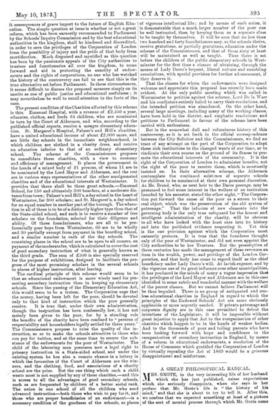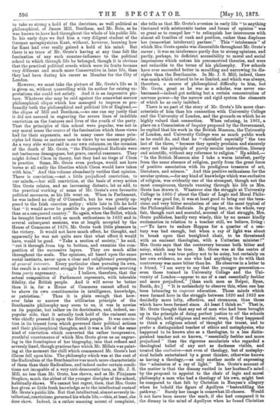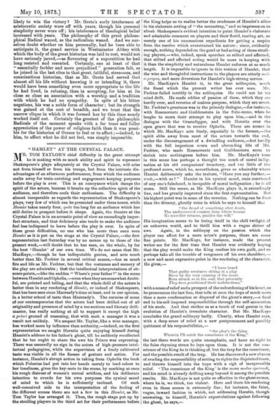A GREAT PHILOSOPHICAL RADICAL.
RS. GROTE, in the very interesting life of her husband ..1.11. which she has just published, raises expectations which she seriously disappoints, when she says in her preface that Mr. Grote's life is "the history of his mind," and that she is about to try to tell it. After this, we confess that we expected something at least of a picture of the sort of mental process through which Mr. Grote came to take so strong a hold of the doctrines, as well political as philosophical, of James Mill, Bentham, and Mr. Bath, as he was known to have had throughout the whole of his public life. In his early days we find him a very diligent student of the German metaphysician Kant, without, however, learning how far Kant had ever really gained a hold of his mind. Bat there is no trace of Mr. Grote's having at any time felt the fascination of any such counter-influence to the political school to which through life he belonged, though it is obvious that the practical political creeds which were its fruits became very different and much more Conservative in later life, than they had been during his career as Member for the City of London.
However, we must take the picture of Mr. Grote's life as it is given us, without quarrelling with its author for raising ex- pectations she could not satisfy. And it is an impressive pic- ture. Whatever else may be said against the somewhat narrow philosophical clique which has managed to impress so pro- foundly both the philosophical and political life of England,— the clique of Mill and Bentham,—no one can say justly that it did not succeed in engraving the severe lines of indelible conviction on the features and lives of the youth of the party. That the principles of this school were popular, was not in any moral sense the source of the fascination which these views had for their exponents, and in many cases the same prin- ciples led them as maturer men to views by no means popular. As a very able writer said in our own columns; on the occasion of the death of Mr. Grote, "the Philosophical Radicals were not barbarous demagogues, but grave, careful reasoners. They might defend Cleon in theory, but they had no tinge of Cleon in practice. Some, Mr. Grote even perhaps, would not have borne at all easily the liberties which Cleon would have taken with him." And this volume abundantly verifies that opinion. There is conviction,—not a little prejudiced conviction, to our minds,—but still conviction, at the basis of every action Mrs. Grote relates, and an increasing distaste, let us add, to the practical working of some of Mr. Grote's own favourite political measures, as his life went on. When in Parliament, he was indeed no ally of O'Connell's, but he was greatly op- posed to the Irish coercion policy ; while late in life he held that "it would never be possible to govern Ireland otherwise than as a conquered country." So again, when the Ballot, which he brought forward with so much enthusiasm in 1833 and in several subsequent sessions, was at length accepted by the House of Commons of 1870, Mr. Grote took little pleasure in the victory. It would not have much effect, he thought, and apparently he was not quite sure that what effect it would have, would be good. "Take a section of society," he said, "cut it through from top to bottom, and examine the com- position of the successive layers. They are much alike throughout the scale. The opinions, all based upon the same social instincts, never upon a clear and enlightened perception of general interests. Every particular class pursuing its own, the result is a universal struggle for the advantages accruing from party supremacy I believe, therefore, that the actual composition of Parliament represents, with tolerable fidelity, the British people. And it will never be better than it is, for a House of Commons cannot afford to be above its own constituencies in intelligence, knowledge,
or patriotism." Thus it is plain enough that how- ever false or narrow the utilitarian principle of the Benthamite philosophy may seem to us, it was in nowise on its popular, but rather on its doctrinaire, and, indeed, un- popular side, that it actually took hold of the eminent men who chiefly pressed it upon the British people. It was convic- tion in its tensest form which governed their political actions and their philosophical thoughts, and it was a life of the same kind of conviction which converted the rather inexpressive, youthful countenance of which Mrs. Grote gives us an engrav- ing in the frontispiece of her biography, into that refined and severely lined, though gracious face which Mr. Millais was paint- ing at the moment the chill which commenced Mr. Grote's last illness fell upon him. The philosophy which was at the root of the Radicalism of the Benthamites was much more characteristic of them than their Radicalism, and indeed under certain condi- tions not incapable of a very anti-democratic turn, as Mr. J. S. Mill, no less than Mr. Grote, has shown, and as Mr. Fitzjames Stephen, much the ablest of the younger disciples of the school, habitually shows. We cannot but regret, then, that Mrs. Grote has given so little fresh knowledge as to the intellectual roots of Mr. Grote's public life. But that intellectual, almost severely in- tellectual, convictions governed his whole life,—this, at least, she does show. Indeed, in a rather amusing accent of complaint,
she tells us that Mr. Grote's aversion in early life "to anything tinctured with aristocratic tastes and forms of opinion" was so great as to compel her "to relinquish her intercourse with almost all families of rank and position, rather than displease her (somewhat intolerant) partner." This " intolerance " of which Mrs. Grote speaks was discernible throughout Mr. Grote's career ; it was an intolerance partly due to strong opinions, and partly, perhaps, to deficithat accessibility to moral and social impressions which outran his preconceived theories, and were not reducible to the terms of his philosophy. Few schools have ever succeeded better in moulding and narrowing its dis- ciples than the Benthamite. In Mr. J. S. Mill, indeed, there was much which refused to be so limited, and which was always, therefore, a source of philosophical difficulty to him, but Mr. Grote, great as he was as a scholar, was never em- barrassed—indeed got nothing but a certain concentration of nervous power—by the narrow and rigid system the elements of which he so early imbibed.
There is no part of the story of Mr. Grote's life more char- acteristic of him than his connection with University College and the University of London, and the grounds on which he so highly valued that connection. When refusing, in 1861, a place on a Commission of Inquiry proposed by the Government, he replied that his work in the British Museum, the University of London, and University College was as much public work as he could do, and that he "cherished especially" the two last of the three, "because they openly proclaim and sincerely carry out the principle of purely secular instruction, literary and scientific, without any reference to religion." He added,— " In the British Museum also I take a warm interest, partly from the same absence of religion, partly from the great force of positive association with its prodigious treasures of art, literature, and science." And this positive enthusiasm for the secular system,—for any kind of knowledge which was exclusive of religion, was evidently one of the strongest, though not the most conspicuous, threads running through his life as Mrs. Grote has drawn it. Whatever else the struggle at University College in 1866-7 about the Chair of Logic and Moral Philo- sophy was good for, it was at least good to bring out the tena- cious and very bitter secularism of one of the most typical of the Philosophical Radicals. In giving her, on the whole, very fair, though curt and scornful, account of that struggle, Mrs. Grote publishes, hardly very wisely, this by no means kindly exclamation in relation to a teacher still, we believe, living : —" To have to endure Hoppus for a quarter of a cen- tury was bad enough, but when a ray of light was about to break upon that benighted chair, to be threatened with an eminent theologian, with a Unitarian minister 1" Mrs. Grote says that the controvery became both bitter and noisy, which may be true. Mr. Grote was at the centre of power, and it was true policy not to be noisy, but certainly on her own evidence, no one who had anything to do with that controversy was more bitter than he. He observes in a letter to a friend, "I am sorry to say that the younger generation— even those trained in University College and the Uni- versity of London—appear to me of a cast essentially feebler and more prejudiced," [than such men as Belper, Ryan, Booth, &c.] "It is melancholy to observe this, when one has been labouring to improve education. Those minds which were formed here in the struggle between 1820 and 1832 are decidedly more lofty, effective, and strenuous, than those which have been formed since. At least I think so." That is, Mr. Grote thought that any set of men who had been brought up in the principle of doing perfect justice to all the schools of thought, both religious and secular, were, if they happened to think a religious school of thought the truest, and to prefer a distinguished teacher of ethics and metaphysics, who happened to be known also as a theologian, to a less distin- guished teacher not so known, "essentially feebler and more prejudiced" than the rigorous secularists who regarded a theological belief of any sort as darkness visible, and treated the exclusion—not even of theology, but of metaphy- sical beliefs entertained by a great thinker, otherwise known as having a theology,—as only another mode of expressing the "admission of a ray of light." Mrs. Grote's account of the matter is that the dismay excited in her husband's mind by the proposal to appoint to the chair of logic and moral philosophy a man who had a theology of his own, might best be compared to that felt by Christian in Banyan's allegory when he beheld the figure of Apollyon "bestraddling the pathway." Surely her image is somewhat ill-chosen. Would it not have been nearer the mark, if she had compared it to the dismay in the mind of Apollyon when he found Christian likely to win the victory ? Mr. Grote's early intolerance of aristocratic society wore off with years, though his personal simplicity never wore off ; his intolerance of theological belief increased with years. The philosophy of this great philoso- phical Radical waxed, as the radicalism waned. And we our- selves doubt whether on him personally, had he been able to anticipate it, the grand service in Westminster Abbey with which the body of the great historian was laid to rest, would not have seriously jarred,—as flavouring of a superstition he had long resisted and resented. Certainly, one at least of that "essentially feebler and more prejudiced" generation felt, as he joined in the last rites to that great, faithful, strenuous, and conscientious historian, that as Mr. Grote had served God almost all his life without knowing it or intending it, there would have been something even more appropriate to the life he had lived, in refusing, than in accepting, for him at its close so close an association with a worship and a tradition with which he had no sympathy. In spite of his bitter negations, his was a noble form of character ; but its strength was gained at the cost of breadth, and we trust that the narrow clique in which it was formed has by this time nearly worked itself out. Certainly the greatest of the philosophic Radicals of the moment speaks with a far truer and fuller appreciation of the power of religious faith than it was possi- ble for the historian of Greece to feel or to affect ; —indeed, to him, to affect what he did not feel, was simply impossible.




































 Previous page
Previous page